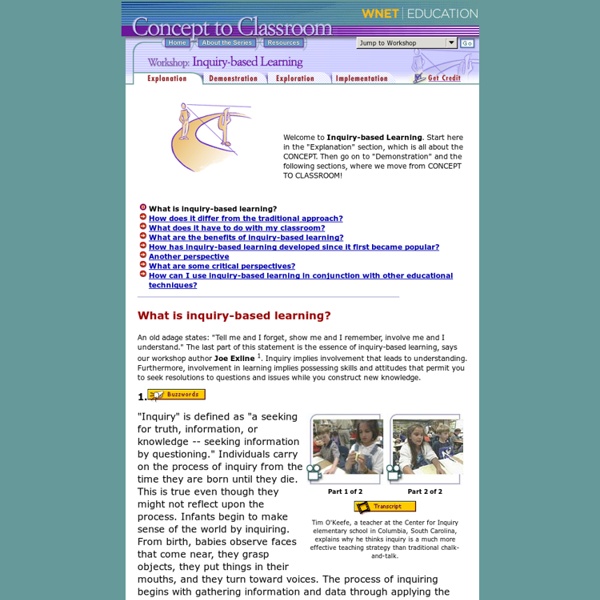Virtual Information Inquiry: Information Inquiry
In inquiry-based learning environments, students are engaged in activities that help them actively pose questions, investigate, solve problems, and draw conclusions about the world around them. As independent thinkers, children become researchers, writers, videographers, and activists rather than passive receivers of a textbook's content. They do meaningful work that addresses essential questions and important standards. It's critical that learners take ownership of the inquiry process.
A Questioning Toolkit
Essential Questions These are questions which touch our hearts and souls. They are central to our lives.
Inquiry Based Learning
Effective inquiry is more than just asking questions. Inquiry-based learning is a complex process where students formulate questions, investigate to find answers, build new understandings, meanings and knowledge, and then communicate their learnings to others. In classrooms where teachers emphasize inquiry-based learning, students are actively involved in solving authentic (real-life) problems within the context of the curriculum and/or community.
What Does Inquiry Look Like in Kindergarten?
The children were engaged in the inquiry process while observing the properties of water. As they worked at learning centres the teacher invited interested children to come and discuss what they know about water and its colour. The children made comments which reflected their emerging understanding of the properties of water. These comments then acted as the basis for which to lead the investigation. The children were then prompted to wonder whether the water is the same colour as the white carnation flower.
Education for Environment and Sustainability
The program is to support academic success and life-long learning, and to develop a responsible citizenry capable of applying knowledge of ecological, economic, and socio-cultural systems to meet current and future needs. Environmental education is a mandatory area of study in Washington, required by 392-410-115: Instruction about conservation, natural resources, and the environment shall be provided at all grade levels in an interdisciplinary manner through science, the social studies, the humanities, and other appropriate areas... The state's K-12 Integrated Environmental and Sustainability Learning Standards describe what students should know and be able to do at each grade level.
The Keys to Inquiry: Introduction
"We learn best when we learn from our own experiences." "Children need to be active learners, seeking answers to questions that they care about.""Science should be hands-on and minds-on so that children make sense of what they experience."
How To Make Students Better Online Researchers
I recently came across an article in Wired Magazine called “ Why Kids Can’t Search “. I’m always interested in this particular topic, because it’s something I struggle with in my middle and high school classes constantly, and I know I’m not alone in my frustrations. Getting kids to really focus on what exactly they are searching for, and then be able to further distill idea into a few key specific search terms is a skill that we must teach students, and we have to do it over and over again. We never question the vital importance of teaching literacy, but we have to be mindful that there are many kinds of “literacies”. An ever more important one that ALL teachers need to be aware of is digital literacy. I could go off in many directions on this, but for the purpose of this post I’m focusing strictly on the digital literacy of searching.
What is Inquiry?
Why Inquiry? Inquiry-based learning approaches when correctly implemented can help develop higher-order, information literacy and critical thinking skills. They can also develop problem-solving abilities and develop skills for lifelong learning.
Adding Emotional Design to eLearning
Emotional design is about the connection that a learner feels while interacting with an e-learning course. This connection can be generated through instructional strategies and creative treatments. Emotional design in an eLearning can be a very powerful tool in engaging the learner, as it gives us better results in retaining and recalling learning. “Emotional design turns casual users into fanatics, ready to tell others about their positive experience” says Aarron Walter, a lead User Experience Designer at MailChimp, in his book Designing For Emotion.
Webinar Series Featuring David Gershon... Registration
Invalid quantity. Please enter a quantity of 1 or more. The quantity you chose exceeds the quantity available. Please enter your name. Please enter an email address.
Information Literacy - Home
What is Information Literacy? Information Literacy is the ability to identify what information is needed, understand how the information is organized, identify the best sources of information for a given need, locate those sources, evaluate the sources critically, and share that information. It is the knowledge of commonly used research techniques.



